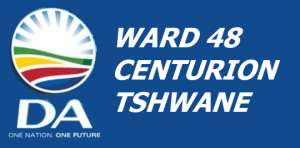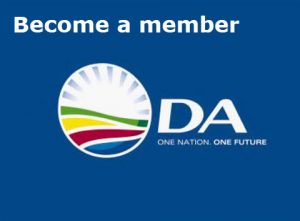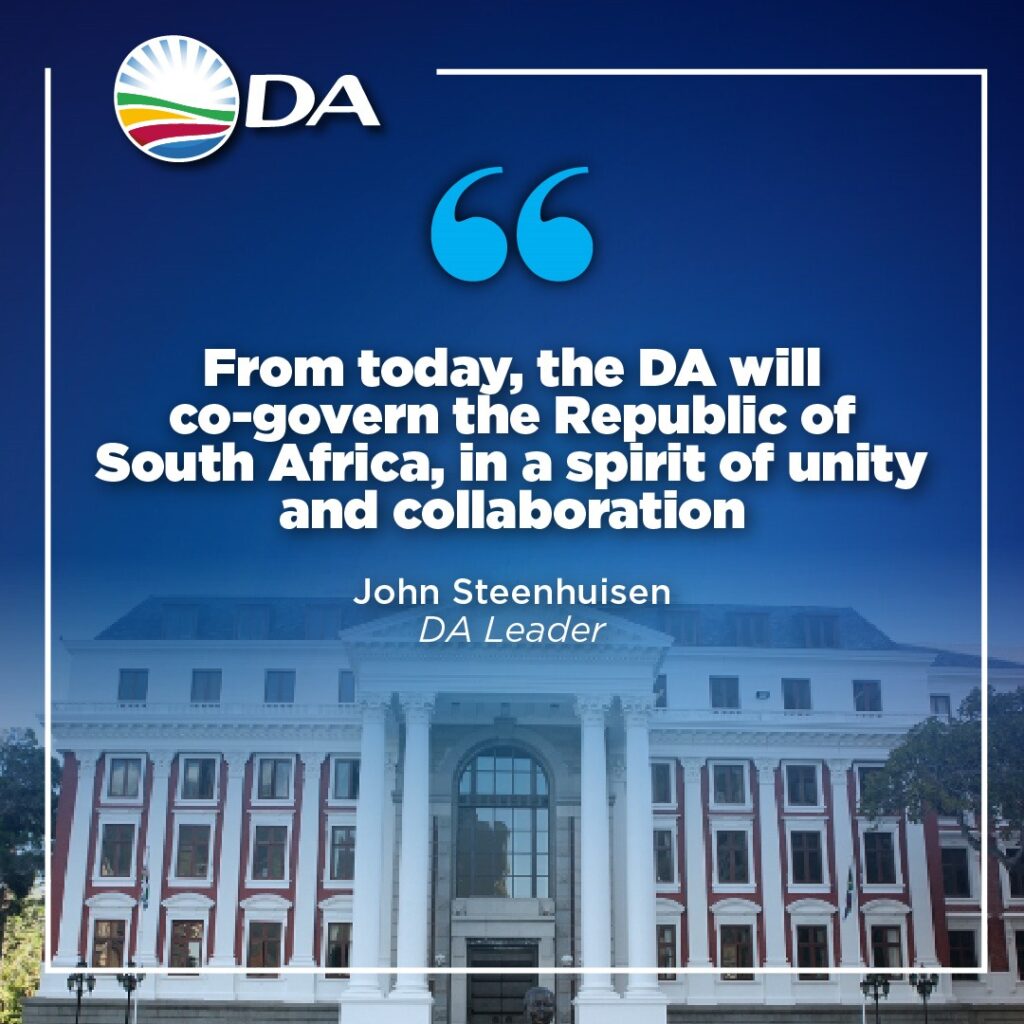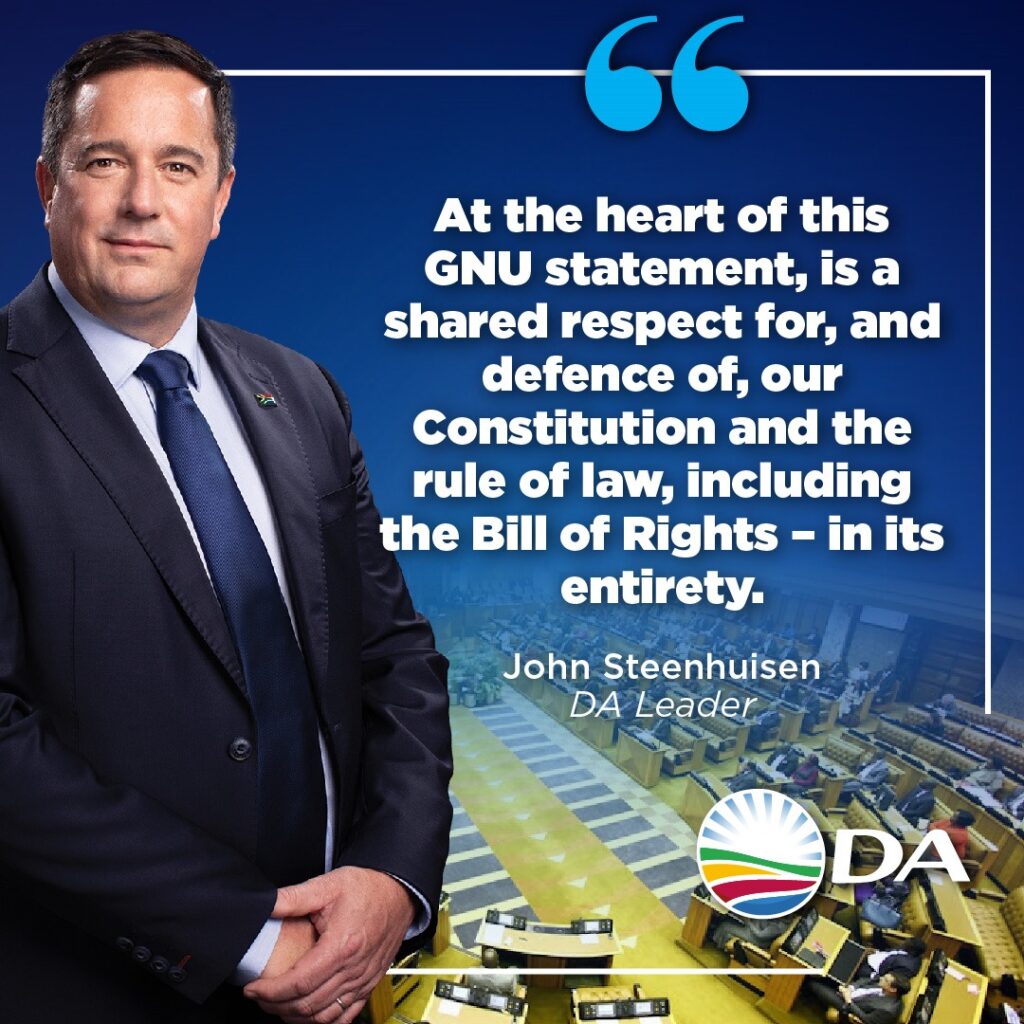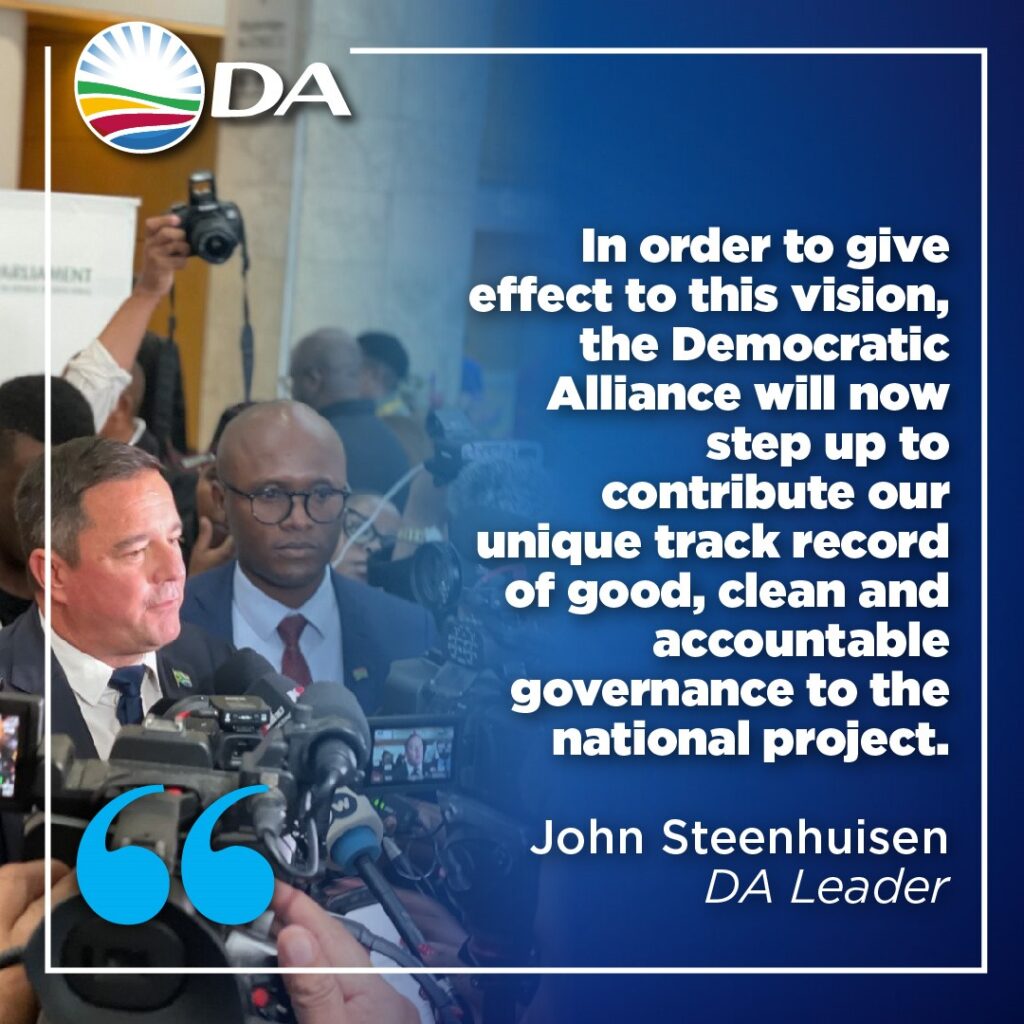WHEREAS the parties to this agreement, listed in Annexure A hereto, have all contested in the Local Government Municipal Elections, held on 1 November 2021.
AND WHEREAS the parties won representation in the CITY OF TSHWANE METROPOLITAN MUNICIPALITY enabling a multi-party coalition government (the Coalition) to be formed.
AND WHEREAS the parties, inclusive of all their public representatives, share certain values, principles, and policy objectives and wish to form a stable and effective government in the CITY OF TSHWANE METROPOLITAN MUNICIPALITY with the purpose of realising pre-identified priorities in the term of office to which their candidates were elected, whilst maintaining their own independent political identities.
AND WHEREAS the parties wish to record and publicise the terms of the coalition agreement for the purpose of transparency, certainty and guidance to all public representatives that are members of the parties serving in the municipality as councillors (Coalition members) as well as to the residents in the municipality.
NOW WHEREFORE the parties agree as follows:
1. COMMITMENTS
The parties agree that the following will be the objectives of the coalition governments that will be formed because of this agreement.
1.1 The coalition shall be called “the coalition government” or the “multi-party coalition” and no single party shall claim ownership of it. All official communication shall refer to the “coalition government” as the entity communicating on behalf of the government.
1.2 A programme of government will be prepared which will take into account the manifestos of coalition parties where reasonably practicable. The programme of government will be known as the “coalition manifesto” and shall be made public.
1.3 A culture of accountability, transparency and good governance will form the foundation of all work to be performed in the municipality.
1.4 All coalition members acknowledge the value of openness and will ensure the accessibility of information to residents of the municipality.
1.5 All coalition members shall be accessible and responsive to all residents of the municipality.
1.6 All coalition members shall endeavour to eliminate corruption and maladministration within the municipality, including a non-negotiable commitment to the rule of law and constitutionalism.
1.7 The separation of party and state will be strictly adhered to by all coalition members.
1.8 The coalition will be committed to correcting the injustices of the past and shall seek to ensure an inclusive economy and society through evidence-based developmental policies and practice.
1.9 All parties shall endeavour to expand opportunities for all, and oppose any forms of racial, gender or other quotas.
1.10 All parties shall uphold non-racialism.
1.11 All parties shall avoid the politics of patronage, nepotism, or self-enrichment, and ensure that fit and proper persons are elected or appointed to higher office in municipal government, including the executive, legislature or administration.
1.12 All coalition members shall ensure the municipality is driven by the pursuit of excellence, this includes diverse merit-based appointments and policymaking guided by evidence and the objectives set out in this agreement.
1.13 Parties to this coalition agreement will strive to reach decisions relating to the management and resolution of conflicts, by consensus. Where consensus cannot be reached, the matter will be escalated in terms of the provisions of this agreement.
1.14 No party to this agreement shall enter into any other coalition in the CITY OF TSHWANE METROPOLITAN MUNICIPALITY which is inconsistent with this agreement.
1.15 Official government communication must advance the governance programme and agreed positions of the coalition government and not that of individual political parties.
1.16 No communication matter that could bring the coalition in disrepute should be released by any signatory party to this agreement, without having exhausted all internal processes outlined in section 6 of this agreement.
1.17 It is agreed that the coalition will hold joint media briefings at least once every three months to showcase the health of the coalition and the performance of the multi-party government.
2. OBJECTIVES
The parties to the agreement will work to:
2.1 ensure that every community has access to reliable, clean, running water, that is safe to drink and to prepare food; modernise water management and the detection of water leaks; and prevent untreated wastewater contaminating the environment, homes, streets, and sidewalks within the municipality.
2.2 ensure there is a hygienic environment to live and play delivered through effective waste collection and rubbish disposal to protect the environment and the health of residents; comply with environmental legislation; and ensure working landfill sites; and the implementation of recycling programmes.
2.3 give residents back their power by helping to reduce their vulnerability to Eskom load shedding and eradicate ESKOM supply areas; and enhance access to reliable, affordable, and sustainable electricity; incentivise pre-paid electricity systems and private electricity generation.
2.4 reclaim public spaces currently taken over by lawlessness, litter, and neglect so that they may be places for all residents to enjoy once again.
2.5 invest in safe, reliable, and affordable public transport, and well-maintained roads; and work to eradicate irrational national taxes and tolls on roads affecting municipal areas.
2.6 develop a holistic infrastructure strategy which combines the imperatives of an increased spend on PPE maintenance, infrastructure renewal and measures to safeguard infrastructure from vandalism and theft.
2.7 be tough on crime and tougher on the causes of crime by investing in localised law enforcement and tackling the local conditions which give rise to crime in the first place.
2.8 focus first on getting the basics right as the foundation to bringing in investment and jobs to the local economy. Beyond that the parties to this agreement are committed to improving the business environment by making it easier to do business within the municipality.
2.9 collaborate for transparent sustainable housing by increasing the scale of housing delivered through private initiative, diversifying housing options, and ensuring more people own their homes and receive their valid title deeds.
2.10 adopt a holistic approach to keeping communities in good health by ensuring that all departments work together to minimise the risks which lead to poor health, to respond effectively to health emergencies, and to achieve overall positive health outcomes.
2.11 govern in the interests of the people by eliminating corruption, adopting best practices in good governance, and ensuring the resilience of communities through effective disaster risk management.
2.12 support devolution of power to the lowest effective level within the constitutional and legislative framework; and ensure the effective functioning of ward committees by providing adequate administrative support.
2.13 promote, where it is deemed appropriate by a competent feasibility study, the establishment of sub-Councils in Metropolitan local governments.
2.14 audit and review the municipality’s organogram and staff complement, including a review as envisioned by Section 4(3)a of the Regulations of the Municipal Structures Act, including remuneration levels; ensure the appointment of fit-for-purpose officials and the review of salary scales before filling vacant posts, where this is indicated by the review; and implement consequence management procedures for the transgression of laws and regulations, or non-performance.
2.15 as per legislation municipal services should be run in a cost reflective manner, where possible we will avoid above-inflation increases in tariffs, rates and taxes, where unavoidable, this shall be adequately explained to the public.
2.16 promote multilingualism and protect and enhance the heritage landscape; and render services in the languages of the said municipality (in accordance with Section 6(3)b of the South African Constitution).
2.17 Be cognisant that illegal immigration and failures to document legal immigrants are issues that impact local governments and requires this coalition government to develop a holistic strategy to respond to these challenges. Any action in relation to illegal immigrants must adhere to the provisions of the South African Constitution, South African law, precepts of international law, the basic tenets of human compassion and decency, and avoid the promotion of xenophobia.
3. TERM OF OFFICE PRIORITIES
3.1 The parties are cognisant of the 5-year statutory term imposed on every municipal council by the Constitution of South Africa. Accordingly, an agreement must therefore be reached on shared projects and/or priorities in the relevant municipality that is achievable in this term.
3.2 As a general priority to every municipality where a coalition government is formed, the following are identified as default priorities:
3.2.1 Good Governance;
3.2.2 Financial sustainability;
3.2.3 Water provision;
3.2.4 Waste management;
3.2.5 Sewerage management;
3.2.6 Electricity provision;
3.2.7 Infrastructure maintenance;
3.2.8 Public and Recreational Spaces;
3.2.9 Roads and Transport;
3.2.10 Safety and Security;
3.2.11 Job Creation and Investment;
3.2.12 Sustainable Housing;
3.2.13 Health;
3.2.14 Environmental Protection;
3.2.15 Devolution of Power;
3.2.16 Public Participation.
3.3 The parties shall, by consulting with local councillors as well as all relevant stakeholders, identify the municipality’s needs / pressing projects and priorities, in addition to the default priorities listed in paragraph 3.2 above that may be achievable within the term of office.
3.4 The parties shall prioritise the projects and take all steps necessary, from within the municipal council to further and realise the projects identified herein, that form part of the Programme of Governance.
3.5 A governance model, which outlines the political and administrative structure of the municipality, will be established by the joint caucus to effectively implement the programme of governance.
3.6 Where legally possible, parties who are part of the coalition government will form part of the interview process for the appointment of municipal managers and other senior managers that report directly to municipal managers.
4. CAUCUSES AND COMMITTEES
4.1 PORTFOLIO CAUCUS (PC)
Parties to this Coalition, through its Councillors, shall:
4.1.1 Establish Portfolio Caucuses for the purposes of coordinating subject specific decision making and coordinating reports to Council within a specific portfolio.
4.1.2 A PC will be set up for each MMC Portfolio and will consist of the MMC, the Section 79 Chairperson and coalition councillors serving in that committee.
4.1.3 The PC may include multi-party caucus councillors representing wards whose residents may be impacted by a particular matter.
4.1.4 The PC will meet prior to each Section 79 to be engaged by the MMC before matters proceed to the committee, the JC and Council with a view to enhancing decision making.
4.2 JOINT CAUCUS (JC)
Parties to the Coalition, through its councillors, shall:
4.2.1 establish a JC for the purposes of ensuring a coordinated response to issues that will serve before the municipal council.
4.2.2 Elect a JC chairperson and deputy-chairperson (who shall not be from the same party as the chairperson).
4.2.3 adopt a set of joint caucus rules in terms of which the JC functions and takes decisions, which rules must be endorsed by the Management Committee of the Coalition.
4.2.4 subject to the reasonable provisions for dissent defined in this agreement, at all times adhere to and support decisions of the JC and not differ publicly from any decision taken, except when it has been decided by the JC that a member, or a party, may exercise a free vote on a question of conscience. A matter of conscience should be defined by clear criteria in the JC rules.
4.2.5 must attend JC caucus meetings punctually and no member is excused from attending a JC meeting except by leave of the chairperson of the JC, or whip of his/her party (where applicable).
4.2.6 must always perform their duties in the relevant forum diligently and to the level and standard required by this agreement.
4.2.7 ensure that the JC is responsible for the proper functioning of the Coalition in the relevant municipality and may, subject to this agreement and subject to the relevant party formations, formulate policy if there is no clear policy on a particular matter and then only in their municipality.
4.2.8 shall be strictly bound to this agreement in realising the objectives and commitments specifically mentioned herein.
4.2.9 apply a non-negotiable principle of “no ambushing or surprises”.
4.2.10 communicate well and effectively within the joint caucus, the coalition government, Portfolio Caucuses, Coalition Management Committee and Coalition Oversight Group.
4.2.11 consult and give reasonable notice, as the caucus rules will reflect, to all parties in the JC before a policy, legislative or motion proposal is introduced in a municipal council especially when a proposal may lead to the removal of an elected political office bearer i.e., speaker, mayor, deputy mayor, chief whip or foreseeably conflict with a fundamental part of a party’s constitution and/or manifesto.
4.2.12 where any elected office bearer resigns, dies, or becomes permanently incapacitated, agree that the office bearer’s deputy, if there is one, will fill that position until a successor is elected.
4.2.13 agree to a coalition management process that is inclusive, accessible, engaging and dispute-resolution driven.
4.2.14 resolve conflict in accordance with the Dispute Resolution Mechanism provided for in clause 6.
4.2.15 Provide Joint Caucus reports to the Management Committee where required and requested.
4.2.16 As a member of the JC, the Coalition elected Speaker will exercise a casting vote in the Council that conforms with the decision of the JC.
4.2.17 If there is no agreed coalition position on a matter to be voted on in council, the JC must request a caucus break to establish such a coalition position.
4.3 MANAGEMENT COMMITTEE (MC)
4.3.1 The day-to-day management and the administration of the Coalition is entrusted to a MC consisting of the Mayor, Deputy Mayor, Joint Caucus Chair, Joint Caucus Deputy Chair, Speaker, Chief Whip and leader of every party’s caucus and that they will reach decisions by sufficient consensus among the parties.
4.3.2 The parties agree that Coalition party leaders (provincial and/or national) may, when invited, attend a MC meeting, insofar as the leader is not the selected representative on the MC. Notice of such attendance shall be given to the MC in order to facilitate same.
4.3.3 The MC must report back to the JC on matters of management and administration issues discussed and considered by the JC.
4.3.4 In the event of problems and potential conflict, the JC shall report to the MC in order that adjudication thereof in terms of the resolution mechanisms, defined in this agreement, can commence.
4.3.5 The MC shall:
4.3.5.1 Meet monthly, or more often, if required or necessary, to discuss:
4.3.5.2 any issues identified by any party.
4.3.5.3 any required engagement with the coalition councillors.
4.3.5.4 any needs for consulting, engaging and training of councillors and thereby identifying disputes.
4.3.5.5 creating awareness of objectives and term priorities of the municipalities.
4.3.5.6 endorse the substitution of any office bearer where a vacancy arises, after consultation and recommendation by the relevant JC.
4.3.6 consider any issues that may arise within a Coalition government, referred to it by the chairperson of the JC, to consider and resolve, if possible. Where the issue is of such a nature that it cannot be readily resolved, the parties may resort to the Conflict Resolution Mechanism set out herein below.
4.4 COALITION OVERSIGHT GROUP (COG)
The parties agree to establish a COG.
4.4.1 Members of a COG shall consist of the national leader of a party in the Coalition (or his/her nominee) and one other provincial leader and the caucus leader of each party in the Coalition.
4.4.2 The COG shall engage from time to time with the MC and the entire
JC of a municipality, where necessary and required.
4.4.3 The COG shall meet every quarter, unless the parties agree that such a meeting is not necessary in a specific quarter. Following such meetings, the COG shall hold media briefings if they have agreed by consensus to do so.
4.4.4 The purpose of the COG is to maintain an oversight role to monitor the health and strength of the Coalition relationship, and to observe the MC or JC with regards to coalition effectiveness, cooperation between parties, strain and transparency.
4.4.5 The COG shall be entitled to attend a JC meeting at a Municipality to oversee and engage where necessary, or a meeting of the MC, if the COG deem it appropriate and necessary.
4.4.6 The COG shall select a chairperson that will serve only as a facilitator of a COG meeting in order that its meetings are orderly and effective.
4.4.7 The COG shall be responsible for adjudicating major disputes, where necessary, to safeguard the integrity of the Coalition.
4.4.8 The COG agrees to resolve disputes referred to it by way of consensus.
4.4.9 The parties agree that should the COG not be able to resolve the dispute before it, the dispute shall then constitute an irreconcilable difference and shall lead to a discussion on the termination of the coalition agreement.
4.4.10 The COG shall, after 100 days of signing this agreement, review the performance and the state of the coalition and progress in implementing this agreement. This review shall take the form of a stock-take and shall also establish whether the parties are abiding by, and mutually co-operating with each other in terms of this agreement.
4.4.11 The COG shall annually, after receipt of the Auditor General’s report, review the state of the coalition in terms of this agreement, and the performance of the coalition government. This review is a stock-take to assess implementation of the programme of governance, and to assess whether each party is abiding by, and being appropriately recognised in terms of the coalition agreement.
5. COMPOSITION OF GOVERNMENTS
5.1 The parties agree that there are certain strategic appointments in a municipality that require careful consideration.
5.2 These strategic appointments require individuals who can fulfil a strong, effective and competent leadership role within the municipality.
5.3 The appointments referred to hereunder include, where applicable, the positions of mayor, deputy mayor, members of the mayoral committee, speaker, chief whip, chairpersons of municipal committees (Section 79 of the Municipal Structures Act, 117 of 1998), chairperson of the municipal public accounts committee, and chairpersons of sub-councils.
5.4 The parties agree that the selection of the positions mentioned above should be beneficial to the coalition with the view of an effective and cooperative coalition.
5.5 The parties agree that the party allocation and proposed councillors to be put forward for appointment in the strategic positions shall be agreed to during the negotiation of the coalition.
5.6 The agreement mentioned in 5.5. shall be reflected and incorporated herein as listed in Annexure C hereto.
5.7 If any party would like to replace a political office bearer elected by the Council, due to death or loss of membership or for any other reason, the vacancy that will occur and the filling thereof would be determined by the relevant party, after consultation with the COG.
5.8 In the event that the Executive Mayor wishes to reshuffle his or her Mayoral Committee for any reason, such a re-shuffle must be conducted after consultation with the COG.
5.9 Any changes to the agreed composition, without following due process, will constitute a major dispute in terms hereof.
5.10 The parties agree that individuals holding these positions will require a strong, effective and competent administrative support staff and reasonable access to portfolio-related training and capacitation.
5.11 The structure of political offices will be designed centrally by the MC and any deviations to the approved structure would need to be approved by the MC. The office bearer shall, thereafter, appoint the staff in the political office and they shall report functionally to the office bearer in question.
6. CONFLICT RESOLUTION MECHANISM
6.1 The parties agree that the success of a Coalition lies in the effective resolution of conflicts that may arise in the Coalition.
6.2 It is imperative that an effective mechanism is established for realisation of good governance and to preserve a good working relationship between the parties.
6.3 The leader and/or whip of each party in the JC may table a dispute that must be dealt with in terms of this section.
6.4 The chairperson of the JC shall, when a dispute arises, record the full extent of the dispute in detail and shall list every member of the JC’s concerns or support of the dispute in question.
6.5 The chairperson shall thereafter, after consultation with the JC, classify the dispute in terms of clause 6.5.
6.6 When a dispute arises and is recorded by the JC in terms of clause 6.3 above, the parties, and their public representatives, should endeavour to resolve it expeditiously, efficiently and effectively, as a commitment to their duty of care towards the coalition, and their mandate from the voters.
6.7 The parties agree that certain disputes that arise may be more complex than others and therefore agree to distinguish between certain types of disputes:
6.7.1 Council Disputes:
6.7.1.1 Any disputes that arise from a party or parties raising an objection to an item on the Council agenda shall be resolved in terms of this section.
6.7.1.2 Once an item is removed from the council agenda due to the objection of a party or parties, a meeting must be convened with the Executive Mayor, Speaker, relevant MMC, Section 79
Committee Chairperson and the caucus leader of the dissenting party in order to agree to the changes necessary to resolve the dispute.
6.7.1.3 If no resolution is found through this process, the dispute is referred to the MC for resolution, and referred back to the JC so that the item can serve at the next council meeting.
6.7.1.4 If the MC cannot resolve the matter, is it to be referred to the
COG and dealt with as a major dispute.
6.7.2 General disputes:
6.7.2.1 Any disputes that arise during the functioning of the coalition should be resolved in terms of this section. The parties can rely on the JC to resolve the dispute and shall resolve same expeditiously and in an effective manner.
6.7.2.2 Should the dispute not be resolved through the JC within a reasonable time, the dispute shall be escalated by the chairperson of the JC to the MC for assistance in the resolution of the dispute, within a reasonable time.
6.7.2.3 Should the dispute not be resolved through the MC within a reasonable time, the dispute shall be escalated by the MC to the COG for assistance in the resolution of the dispute, within a reasonable time and by way of consensus.
6.7.3 Major disputes concerning the material provisions of this agreement:
6.7.3.1 Disputes envisaged hereunder reference disputes that concern altering any of the provisions of this agreement.
6.7.3.2 The chairperson of the JC shall immediately escalate the dispute to the COG within a reasonable period and it should then be resolved in the most effective, participative and expeditious way.
6.7.3.3 The COG shall resolve a dispute envisaged hereunder by way of consensus after receiving the input of the MC and considering any relevant considerations.
6.7.3.4 The COG shall notify the chairperson of the JC of the resolution to the major dispute and the chairperson shall forthwith notify the JC.
6.7.3.5 The resolution shall be respected and implemented by the JC.
7. VARIATION TO THIS AGREEMENT
7.1 This agreement constitutes the entire agreement between the parties and no terms or conditions hereof shall be in any circumstances capable of being varied in any way unless in writing under the signature of the parties hereto;
7.2 The Parties agree to review the agreement after six months from the date of its implementation with the view to improving its functioning in relation to problems that may have arisen. Such changes must be agreed to by sufficient consensus.
8. EXIT / TERMINATION
8.1 The parties agree that a Coalition can only be successful if all parties respect and adhere to this agreement.
8.2 The parties agree that a dispute not resolved through the mechanisms of this agreement, will activate the termination of the agreement for the party concerned and may terminate the coalition as a whole. The chairperson of the COG shall keep record of the dispute and the attempts to obtain consensus. The chairperson of the COG shall circulate the record to all members of the COG.
8.3 Also, if at any time, the parties, inclusive of all their public representatives, no longer share the same values, principles and policy objectives, and it is not possible to have a stable, cooperative and effective Coalition, reasonable notice of a party’s intention to exit this agreement must be given by that party to the COG.
8.4 Should termination follow because of 8.2 above, the COG shall notify the chairperson of the JC who shall forthwith notify the members of the JC of the termination and the reasons therefore and the termination of the coalition shall take immediate effect.
8.5 The party that exits the Coalition in accordance with clause 8.3 above, shall provide written notice and reasons for the exit to the COG and parties thereto may elect to publish same accordingly.
9. PUBLICATION OF THE AGREEMENT
9.1 The parties to this agreement accept that the Coalition affects each party to the Coalition, its members, and the electorate.
9.2 The members of the Coalition accept that the Coalition needs to be transparent and every member to this agreement, whether party or councillor, must be held responsible in accordance herewith.
9.3 Publication of this agreement will lead to public confidence and may hold the coalition government accountable.
9.4 The parties agree that the announcement of this Coalition shall be made in a joint statement by the parties involved.
9.5 It is agreed that the contents of this agreement be made public in the languages of the said municipalities (in accordance with Section 6(3)b of the South African Constitution).
9.6 In the event of a major dispute and termination of this agreement, any party may disclose to the public that the coalition was so terminated.
(END)
SIGNATURE PAGE: CITY OF TSHWANE
Signed at PRETORIA on this 15th day of December 2021.
ANNEXURE A
PARTIES TO THE COALITION AGREEMENT
| PARTY NAME | ABBREVIATION | |
| 1. | Democratic Alliance | DA |
| 2. | ActionSA | ActionSA |
| 3. | Inkatha Freedom Party | IFP |
| 4. | Vryheidsfront Plus | VF Plus |
| 5. | African Christian Democratic Party | ACDP |
| 6. | Congress of the People | COPE |
ANNEXURE B
ADDITIONAL PRIORITIES IDENTIFIED BY THE MUNICIPALITY
| 1. | Immigration Be cognisant that illegal immigration and failures to document legal immigrants are issues that impact local governments and requires this coalition government to develop a holistic strategy to respond to these challenges. Any action against illegal immigrants must adhere to the provisions of the South African Constitution, South African law, precepts of international law, the basic tenets of human compassion and decency, and avoid the promotion of xenophobia. |
| 2. | Insourcing The insourcing of security and cleaning personnel when the business case for such confirms the principles of both financial sustainability and the provision of dignity of formal employment to these personnel. |
| 3. | Inner City Rejuvenation The rejuvenation of Inner-City regions of the municipality through the implementation of a multi-disciplinary strategy. |
| 4. | Labour Relations The development on Memoranda Of Understanding (MOU), as contemplated by Section 23 of the Labour Relations Act, with the represented trade unions of the municipality. Such MOUs should be ratified by the Bargaining Council and should strive to strengthen labour relations and achieve a joint commitment to service delivery. |
ANNEXURE C
COMPOSITION OF GOVERNMENT
| POSITION | PARTY |
| Executive Mayor | DA |
| Deputy Mayor | ActionSA |
| Speaker | COPE |
| Chief Whip | DA |
| Chair of Chairs | VF Plus |
| MMC: Finance | DA |
| MMC: Environmental and Agriculture Management | DA |
| MMC: Economic Development and Spatial Planning | ActionSA |
| MMC: Health | VF Plus |
| MMC: Community Safety | VF Plus |
| MMC: Housing and Human Settlement | ActionSA |
| MMC: Corporate and Shared Services | DA |
| MMC: Utility Services | DA |
| MMC: Roads and Transport | DA |
| MMC: Community and Social Development | ActionSA |
| Chairperson: Municipal Public Accounts – MPAC | ActionSA |
| Chairperson: Integrated Development Plan – IDP | VF Plus |
| Chairperson: Local Geographical Names | DA |
| Chairperson: Civilian Oversight | DA |
| Chairperson: Rules and Ethics | DA |
| Chairperson: Petitions | DA |
| Chairperson: Finance | VF Plus |
| Chairperson: Environmental and Agriculture Management | ACDP |
| Chairperson: Economic Development and Spatial Planning | VF Plus |
| Chairperson: Health | DA |
| Chairperson: Community Safety | ActionSA |
| Chairperson: Housing and Human Settlement | DA |
| Chairperson: Corporate and Shared Services | VF Plus |
| Chairperson: Utility Services | ActionSA |
| Chairperson: Roads and Transport | ActionSA |
| Chairperson: Community and Social Development | DA |





